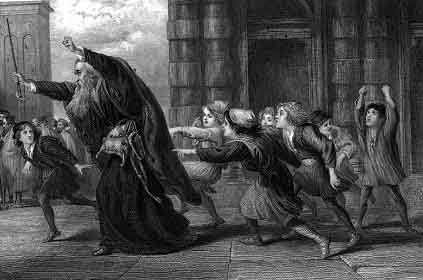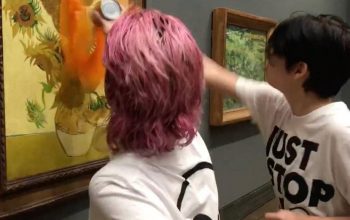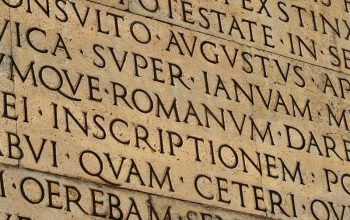by Max Skinwood
“If it will feed nothing else, it will feed my revenge. And if you wrong us, shall we not revenge? Why, revenge. The villainy you teach me I will execute—and it shall go hard but I will better the instruction.”
This part of Shylock’s speech from the late 16th century Shakespearean play Merchant of Venice appears almost prophetic for the way that it portrays our world today, so much so that it could have been written last week. From the earliest records that we have found, we see that there has been some form of class division in every society, and time, if anything, has only reinforced that division.
There are three basic parts to Shylock’s speech quoted above, one of which is bias or class division, the next – just being human, and the third principal part – revenge. I maintain that revenge like prejudices is a man-made social construct arising out of discontent.
At this point in the play (3, 1) we see discontent with several of the main characters involved. Bassanio asks his friend Antonio, a Venetian shipping merchant, for a loan in order to travel in style to Portia’s estate. Antonio agrees, but grumbles that he is unable to make the loan himself because all of his money is invested in ships that are at sea. We see that Portia wants Bassanio to pick the right casket, thus wining her hand in marriage and not the other suitors seeking her hand that she would be forced to marry.

This is where Shylock comes in. Antonio suggests that Bassanio ask Shylock, a Jewish moneylender, for a loan. Shylock has a venerable grudge against Antonio, who has made it a routine display of haranguing Jews for overcAntonio will not consider apologizing for his behavior, but Shylock agrees and offers to lend Bassanio the money with no interest. Shylock adds, however, that should the loan go unpaid, he will be entitled to a pound of Antonio’s own flesh as guarantor.
Shylock’s greatest dream comes true when he finds out that Antonio’s ships have sunk, losing his ability to repay the debt. The matter goes before a Venetian court, where Shylock makes his case and is almost handed an undisputed win. He unexpectedly runs into a young law clerk (Portia in disguise) that is sent to defend Antonio. All by the letter of the law, and using the same techniques as Shylock employ, Portia not only gets the decision reversed but also forces Shylock into a position where he is forced to not only to give up half of his wealth, but also convert to Christianity. Shylock is forced into this position because he is blinded by this social construction called revenge—retribution he believes that is owed to him by Antonio’s actions.
By lexical definition, a social construct is: a social mechanism, phenomenon, or category created and developed by society; a perception of an individual, group, or idea that is ‘constructed’ through cultural or social practice.
Would it change the meaning of the play if the questions Shylock asks remained the same while he were any other ethnicity and Antonio wasn’t a Christian? Ultimately, no, it wouldn’t. Now how does this apply to today’s world? As we are led to believe, all people are created equal. From history, this appears to have been more true during Shylock’s time than it is today. There was less color friction in the 1600s. At that time it was more about how wealthy you were or essentially what religion you identified with. In the last four hundred years, biases such as race or sexual orientation have all replaced Antonio’s repeated (now seemingly minor) insults against the Jewish moneylenders. The hatred triggered by these prejudices is paid for in blood.
One may ask, how are these prejudices dealt with? One of the answers seems to be violence. The culture created by white supremacists in what is now known as Red Summer. This was the summer after WWI ended, when black soldiers from the 369th Regiment – Hellfighters – came home to the United States expecting to be treated equally. Their payment for this faith was facing physical beating—worse conditions than when they left—as well as hanging, some still in uniform. This kind of of violence is the cruelest kind resulting from hatred. And such hatred is based on another socially constructed ideal that you have no control over, namely skin color.
At this time in history, other merchants of different color or clothing might have been killed on sight whereas one hundred years later, at many cross-roads or ports, strangers of all types were welcomed with (mostly) open arms. Again, if Shylock were any other ethnicity, would it change the meaning of the play?
Another factor is the time period that we chose to insert, and the class of people. Merchants like Shylock were accepted as businessmen, but not held in high regard in the community. Knowing this, he knew he would never get a fair trial in a Venetian court. He was constantly fighting an uphill battle because he wasn’t Christian. It is well comparable today to a black man or woman who may feel they are being kept down just because of their skin color and not because there is a definitive lack of qualifications or just not the right fit. The perception then becomes personal instead of factual, thus a constructed idea. Where do these subjective ideas stem from?
Prejudices are often handed down from father to son, i.e. are learnt over the years, based on man’s need to feel superior or inferior. I maintain the belief that personal preferences for what you like/dislike or want/not want are twisted into what is perceived as prejudice. A stereotype is built from multiple incidents that may include personal values, morals, and beliefs that cause you to see a certain kind of people the same way. Does it have to have a quantitative value? That is, does it take one or two examples once a week, or do you have to see one or two every day for it to become an expectation so that the expectation becomes a stereotype? Most impressions that we get or have about other people are based on cultural or social experiences, and turned into gross generalizations or stereotypes. In the play under discussion, Antonio doesn’t single out Shylock; he makes disparaging remarks about the whole group of Jewish moneylenders, due to the fact, or perception, that all of them charge high interest rates on loans, even undermining them by giving interest-free loans.
Shylock wants his pound of flesh, as he feels he needs to make a statement in a way that the Christians will understand. “If it will feed nothing else, it will feed my revenge.” This line from Shylock speaks as a perfect example of how deep the socially-drawn subjective feeling runs. It is no wonder that the hatred runs deep on both sides of any coin, whether racial or religious.
One wonders naturally how long is this going to go on. What has really changed in the last 400 years? The easy answer is: everything; looking deeper, the answer then becomes: nothing really. The only significant change between the two time periods is technology. Otherwise, people still act and react in Venice now, much as as they did then. Only now we have social-media, leading to both good and bad manipulations of the facts, not to mention the forms of retaliation are more violent and opportunistic today.
Shylock asks if he should not have his revenge. At what point does the need for vengeance cease? Shylock wouldn’t accept repayment no matter what the terms, because he felt disrespected and slighted just for being Jewish. The whole tale would have continued to spiral out of control if Portia hadn’t used her own tactics to outsmart him. What would the outcome have been if Shylock had access to weapons that we have today? Antonio’s ships probably would have been sunk for sure, furthering the war and inciting more violence and feeling the need for revenge.
Socially constructed subjects like revenge/reprisal or prejudices/biases are likely to overcome if the group being characterized is willing to make a change as well as the group making the categorization. The whole matter of the Jewish moneylenders being ill-treated by Antonio and like-minded folks could have changed for better if the group as a whole changed the outside world’s perception of them by lowering their rates. Antonio, in turn, might have not chastised them mercilessly for usury. This would have led to there being no reason for Shylock wanting nor having any reason to exact his pound of flesh. The same can be said for the soldiers coming home after the war. A century of racial tensions may have been avoided, had there been no buying and selling of people, and history might have had a less bloody outcome.
About the Author
Max is a Southern gentleman, who is currently working towards his BA from UT @ Austin. He is a former Marine who understands what it means to serve.


